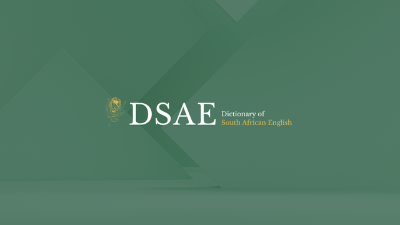
In March this year the Dictionary Unit for South African English (DSAE), housed in the historic St Peter’s Building on the Rhodes University campus, released the 2025 Revised Edition of its open-access online Dictionary of South African English (http://dsae.co.za). This significant milestone for the Unit includes the addition of over 100 new words from a range of subject domains such as Sport (shibobo, diski), Law (Aquilian liability, cession), Music (boereqanga, amahubo), Politics and History (the struggle, struggle credentials), Food and Drink (chakalaka, walkie talkies, papsak), Cultural terms (ekasi, boerewors curtain, after tears) as well as words found in everyday usage (load shedding, fong kong, makoya, eish, tsek). This edition also introduces an exciting new feature, namely audio pronunciations for over three thousand entries, drawn from the Unit’s unparalleled phonetic dataset of authentic audio recordings of South African English words, providing multiple variant pronunciations that supplement the original phonetic transcriptions.
The DSAE’s commitment to accessibility and innovation started in 2019 when it published the enhanced Desktop Edition of the online Dictionary of South African English and a fully responsive Mobile Edition the following year. This marked an important step forward and a global first for the Unit by making available an online dictionary specifically dedicated to the South African variety of English, emphasising cross-platform usability. With over 4 700 main entries encompassing approximately 14 700 word forms, supported by more than 1.7 million words of illustrative text, the online Dictionary of South African English is the most comprehensive existing account of the origins, registers and historical development of English as it is used in South Africa. Most importantly, the work is descriptive, not prescriptive, and documents how South African English has evolved through usage since the late 17th century. Entries are richly illustrated by approximately 45 000 bibliographically referenced quotations from sources as diverse as William Burchell, contemporary writer Mothobi Mutloatse, the 18th century botanist and explorer Anders Sparrman, early African nationalist and writer Sol Plaatjie, adventure novelist H. Rider Haggard and writer and journalist Rian Malan. A Visual Edition (http://visual.dsae.co.za) was published in 2022, offering new insights into the evolution of SAE through macro- and micro-visualisations and data aggregation techniques to render graphical overviews of lexical and bibliographic data.
As the dictionary moved through these publication phases it rapidly acquired the features of a Digital Humanities project, reaching beyond the domain of 'classic' lexicography. The project now draws on the disciplines of Computer Science, Information Systems and Corpus Linguistics. Techniques from these domains have been applied in the form of web application design, data visualisation, the creation of a unique lexical as well as phonetic database of South African English, and a growing South African English corpus currently containing over 3 billion words. These data resources housed at the DSAE lie behind the public-facing online dictionary and present opportunities for scholarly research and collaboration.
The DSAE has a longstanding relationship with Rhodes University, the initial dictionary research project having been established in 1969 under the leadership of Professor William Branford, Rhodes University’s first Professor of English Language and Linguistics. In 1996 the Unit published A Dictionary of South African English on Historical Principles (Oxford University Press), of which 100 copies of a special edition were signed by President Nelson Mandela. This monumental work, the culmination of nearly three decades of dedicated research with a large cohort of volunteer readers and input from the editors of the Oxford English Dictionary, provided a comprehensive historical record of South African English from the late 16th century up to 1995. Its editorial team was subsequently awarded a gold medal by the English Academy of South Africa. Today the Unit is the official English National Lexicography Unit established by the Pan South African Language Board Act with the mandate of promoting language development by compiling dictionaries and related lexicographical products. Additionally the DSAE is a member of the English National Language Body, advising government on issues such as language policy, terminology development and monitoring language use. The Unit is internationally recognised as an authoritative source of information on South African English and remains a vibrant centre of research and innovation.
The online Dictionary of South African English is open access and available at dsae.co.za. For more information about the Dictionary Unit for South African English visit http://www.ru.ac.za/dsae or follow us on Facebook and Instagram.
